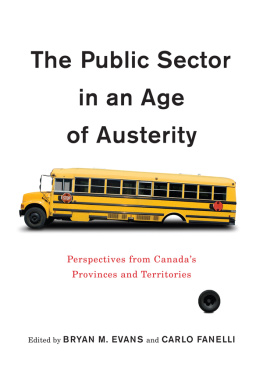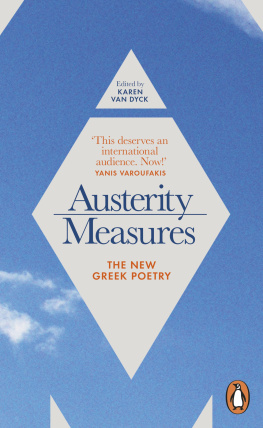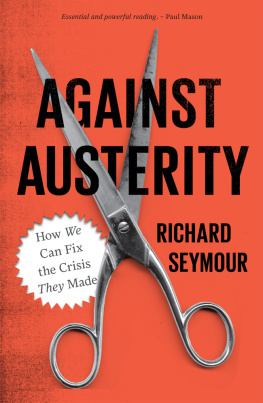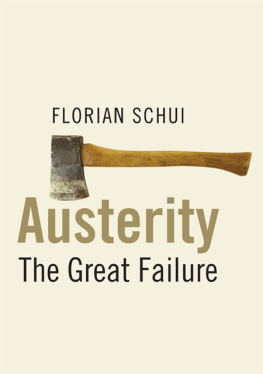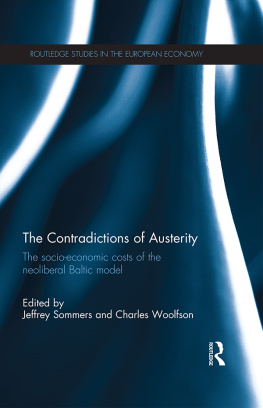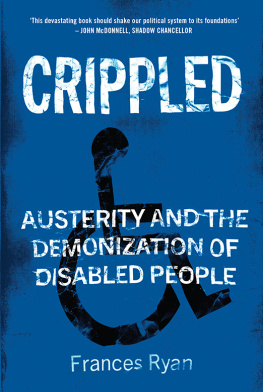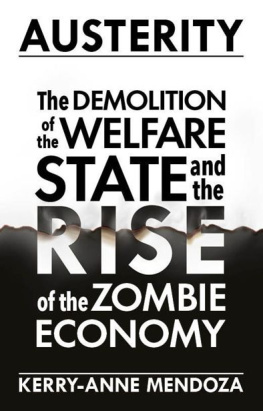Shefner Jon - Why Austerity Persists
Here you can read online Shefner Jon - Why Austerity Persists full text of the book (entire story) in english for free. Download pdf and epub, get meaning, cover and reviews about this ebook. year: 2019, genre: Politics. Description of the work, (preface) as well as reviews are available. Best literature library LitArk.com created for fans of good reading and offers a wide selection of genres:
Romance novel
Science fiction
Adventure
Detective
Science
History
Home and family
Prose
Art
Politics
Computer
Non-fiction
Religion
Business
Children
Humor
Choose a favorite category and find really read worthwhile books. Enjoy immersion in the world of imagination, feel the emotions of the characters or learn something new for yourself, make an fascinating discovery.
- Book:Why Austerity Persists
- Author:
- Genre:
- Year:2019
- Rating:3 / 5
- Favourites:Add to favourites
- Your mark:
- 60
- 1
- 2
- 3
- 4
- 5
Why Austerity Persists: summary, description and annotation
We offer to read an annotation, description, summary or preface (depends on what the author of the book "Why Austerity Persists" wrote himself). If you haven't found the necessary information about the book — write in the comments, we will try to find it.
Why Austerity Persists — read online for free the complete book (whole text) full work
Below is the text of the book, divided by pages. System saving the place of the last page read, allows you to conveniently read the book "Why Austerity Persists" online for free, without having to search again every time where you left off. Put a bookmark, and you can go to the page where you finished reading at any time.
Font size:
Interval:
Bookmark:

Jon Shefner
Cory Blad
polity
Copyright Jon Shefner and Cory Blad 2020
The right of Jon Shefner and Cory Blad to be identified as Authors of this Work has been asserted in accordance with the UK Copyright, Designs and Patents Act 1988.
First published in 2020 by Polity Press
Polity Press
65 Bridge Street
Cambridge CB2 1UR, UK
Polity Press
101 Station Landing
Suite 300
Medford, MA 02155, USA
All rights reserved. Except for the quotation of short passages for the purpose of criticism and review, no part of this publication may be reproduced, stored in a retrieval system or transmitted, in any form or by any means, electronic, mechanical, photocopying, recording or otherwise, without the prior permission of the publisher.
ISBN-13: 978-1-5095-0986-7
ISBN-13: 978-1-5095-0987-4 (pb)
A catalogue record for this book is available from the British Library.
Library of Congress Cataloging-in-Publication Data
Names: Shefner, Jon, 1958- author. | Blad, Cory, author.
Title: Why austerity persists / Jon Shefner, Cory Blad.
Description: Medford, MA : Polity Press, [2019] | Includes bibliographical references and index.
Identifiers: LCCN 2019016713 (print) | LCCN 2019980321 (ebook) | ISBN 9781509509867 (hardback) | ISBN 9781509509874 (pbk.) | ISBN 9781509509904 (ebook)
Subjects: LCSH: Economic policy. | Economic development--Government policy--Case studies. | Government spending policy. | Social policy.
Classification: LCC HD87 .S5424 2019 (print) | LCC HD87 (ebook) | DDC 336--dc23
LC record available at https://lccn.loc.gov/2019016713
LC ebook record available at https://lccn.loc.gov/2019980321
Typeset in 10.5 on 12pt Plantin
by Fakenham Prepress Solutions, Fakenham, Norfolk, NR21 8NL
Printed and bound in the UK by CPI Group (UK) Ltd, Croydon
The publisher has used its best endeavours to ensure that the URLs for external websites referred to in this book are correct and active at the time of going to press. However, the publisher has no responsibility for the websites and can make no guarantee that a site will remain live or that the content is or will remain appropriate.
Every effort has been made to trace all copyright holders, but if any have been overlooked the publisher will be pleased to include any necessary credits in any subsequent reprint or edition.
For further information on Polity, visit our website: politybooks.com
| AFDC | Aid to Families with Dependent Children |
| ALEC | American Legislative Exchange Council |
| ANC | African National Congress |
| BEE | black economic empowerment |
| CONAIE | Confederacon de Nacionalidades Indigenas de Ecuador/Confederation of Indigenous Nationalities of Ecuador |
| EC | European Commission |
| ECA | Employment Contracts Act |
| ECB | European Central Bank |
| EEC | European Economic Community |
| EMU | Economic and Monetary Union |
| ESAP | Economic Structural Adjustment Programme |
| EU | European Union |
| FDI | foreign direct investment |
| FEE | Foundation for Economic Education |
| FIRE | finance, insurance, real estate |
| FUT | United Workers Front |
| GEAR | Growth, Employment, and Redistribution strategy |
| HIPC | Heavily Indebted Poor Countries |
| IFIs | international financial institutions |
| IMF | International Monetary Fund |
| ISI | import substitution industrialization |
| MDRI | Multilateral Debt Relief Initiative |
| MTFS | Medium-Term Fiscal Strategy |
| NAFTA | North American Free Trade Agreement |
| OPEC | Organization of the Petroleum Exporting Countries |
| PAH | Plataforma de Afectados por la Hipoteca/Platform for the Mortgage-Affected |
| PRI | Partido Revolucionario Institucional/Party of the Institutionalized Revolution |
| PRSPs | Poverty Reduction Strategy Papers |
| RDP | Reconstruction and Development Program |
| SAREB | La Sociedad de Gestin de Activos Procedentes de la Reestructuracin Bancaria/Bank Restructuring Asset Management Society |
| SNP | Scottish National Party |
| TANF | Temporary Assistance for Needy Families |
| UKIP | UK Independence Party |
| VAT | value-added tax |
| ZANUPF | Zimbabwe African National UnionPatriotic Front |
| ZAPU | Zimbabwe African Peoples Union |
| ZCTU | Zimbabwe Congress of Trade Unions |
Jon Shefner would like to acknowledge his collaborators in his work on austerity over the years. These include his coauthor on this project, Cory Blad, and also George Pasdirtz, Aaron Rowland, Steven Panageotou, and Julie Stewart. Hes learned from all of these friends and coworkers, but from none more than John Walton, whose pioneering work on austerity protests serves as a constant inspiration. Jon additionally thanks Fred Block, Paul Gellert, Frances Fox Piven, and Gay Seidman for comments, inspiration, and encouragement. Jonathan Skerrett at Polity has been a generous and helpful editor. The book has benefited significantly from the work of Politys reviewers. Emily Landry and Charles Walton provided substantial help in the research and editing process, Emily especially providing excellent and painstaking assistance as the work was completed. Jon also thanks Karen for everything, always. Finally, Jon wants to note that working with Cory Blad again has been a great joy.
Cory Blad would like to thank several people who have contributed to this effort in one way or another. Ricardo Dello Buono, Emanuele Ferragina, and Samuel Oloruntoba each contributed to his thinking on austerity and contemporary political economic trends. Conversations with Vicki Dabrowski and Elena Daz Gonzlez provided new insights and have encouraged him to broaden his understanding of conditional possibilities. As always, Julia, Zo, and Sanna continue to provide inspiration and demonstrate infinite patience.
Many Paths to Austerity
On February 2, 1989, during his inaugural address, Venezuelas President Carlos Andrs Prez emphasized the need for a debtors cartel and called for a new international policy aimed at reducing Third World debt. Since the Mexican governments announcement of its inability to pay its debt in 1982, and subsequently accession to austerity measures, debt had become the central issue of the developing world. The Presidents contentious inaugural rhetoric soon proved empty, however, when he agreed to International Monetary Fund (IMF) requests that austerity policies be imposed as conditions of debt relief. Venezuelans interpreted the agreement as a betrayal; during Prezs previous term as President (19749), he had served as a strong voice for social democratic foreign and domestic policies.
The IMF conditions followed a design by then familiar across the Global South. The government implemented austerity measures, including increases in gasoline prices and transportation fares, lifting price controls over goods and services, freezing public hiring, imposing a national sales tax, as well as raising domestic interest rates and devaluing the currency. These measures, combined with shortages of various food commodities, hurt many Venezuelans; they responded with peaceful marches in the capital city Caracas, with protest immediately following in other cities.
Next pageFont size:
Interval:
Bookmark:
Similar books «Why Austerity Persists»
Look at similar books to Why Austerity Persists. We have selected literature similar in name and meaning in the hope of providing readers with more options to find new, interesting, not yet read works.
Discussion, reviews of the book Why Austerity Persists and just readers' own opinions. Leave your comments, write what you think about the work, its meaning or the main characters. Specify what exactly you liked and what you didn't like, and why you think so.




